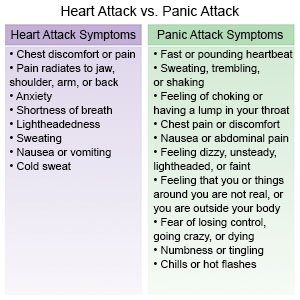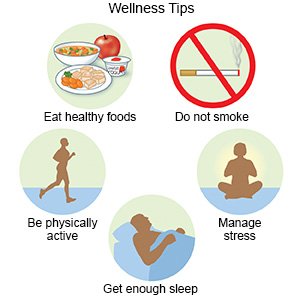Panic Disorder
Medically reviewed by Drugs.com. Last updated on Apr 6, 2025.
Panic disorder is an anxiety disorder that causes you to have sudden panic attacks. A panic attack feels more serious than it is. Breathe deeply to try to calm yourself during an attack. Healthcare providers can help you learn to prevent panic attacks or keep them from getting worse.
 |
DISCHARGE INSTRUCTIONS:
Call your local emergency number (911 in the US) if:
- You have any of the following signs of a heart attack:
- Squeezing, pressure, or pain in your chest
- You may also have any of the following:
- Discomfort or pain in your back, neck, jaw, stomach, or arm
- Shortness of breath
- Nausea or vomiting
- Lightheadedness or a sudden cold sweat
Call your doctor or therapist if:
- You have new or worsening symptoms.
- You have questions or concerns about your condition or care.
Drugs used to treat this and similar conditions
Nortriptyline
Nortriptyline is a tricyclic antidepressant and is used to treat symptoms of depression. Includes ...
Medicines:
- Medicines , such as antianxiety and antidepressants, may be given to treat panic disorder. You may need to take antidepressants for several weeks before you begin to feel better.
- Take your medicine as directed. Contact your healthcare provider if you think your medicine is not helping or if you have side effects. Tell your provider if you are allergic to any medicine. Keep a list of the medicines, vitamins, and herbs you take. Include the amounts, and when and why you take them. Bring the list or the pill bottles to follow-up visits. Carry your medicine list with you in case of an emergency.
Treatment options
The following list of medications are related to or used in the treatment of this condition.
What you can do to manage panic disorder:
- Keep a record of your panic attacks. The record should include each panic attack, how long it lasted, and anything that helped stop it. Bring your record with you every time you see your healthcare providers.
- Manage stress. Stress can trigger a panic attack. Ways to lower your stress level include yoga, meditation, and talking to someone about the stress in your life.
- Exercise as directed. Exercise can reduce stress and help you sleep better. Try to get at least 30 minutes of physical activity on most days of the week. Your healthcare provider can help you create an exercise plan.
- Set a sleep schedule. Too little sleep can increase anxiety. Go to bed at the same time each night and wake up at the same time each morning. Keep your room quiet and free from distractions, such as a television or computer.
- Eat a variety of healthy foods. Healthy foods include fruits, vegetables, low-fat dairy products, lean meats, fish, and beans. Limit sugar. Sugar can increase your symptoms.
- Do not have foods or drinks that contain caffeine. These may include coffee, tea, soda, energy drinks, and chocolate. Caffeine can make anxiety worse or trigger a panic attack.
- Limit alcohol. You may think alcohol makes you calmer, but it is not a safe or effective way to control anxiety. Alcohol can increase anxiety if you drink large amounts or drink often. Ask your healthcare provider how much alcohol is okay for you to drink. A drink of alcohol is 12 ounces of beer, 5 ounces of wine, or 1½ ounces of liquor.
- Do not smoke. Nicotine and other chemicals in cigarettes and cigars can increase anxiety. Ask your healthcare provider for information if you currently smoke and need help to quit. E-cigarettes or smokeless tobacco still contain nicotine. Talk to your healthcare provider before you use these products.
 |
Follow up with your doctor or therapist as directed:
Your healthcare providers will ask if medicine is helping to reduce your symptoms. Tell them about any side effects or problems you have with your medicine. Sometimes the type or amount of medicine may need to be changed. Write down your questions so you remember to ask them during your visits.
© Copyright Merative 2025 Information is for End User's use only and may not be sold, redistributed or otherwise used for commercial purposes.
The above information is an educational aid only. It is not intended as medical advice for individual conditions or treatments. Talk to your doctor, nurse or pharmacist before following any medical regimen to see if it is safe and effective for you.
Learn more about Panic Disorder
- Antidepressants: Options, Advantages, and Precautions
- Anxiety Medications and Alcohol Interactions
- Benzodiazepines: Overview and Use
Treatment options
Care guides
- Agoraphobia
- Anxiety in Adolescents
- Anxiety in Children
- Panic Attack
- Panic Attack in Children
- Panic Disorder
Medicine.com guides (external)
Further information
Always consult your healthcare provider to ensure the information displayed on this page applies to your personal circumstances.
